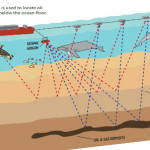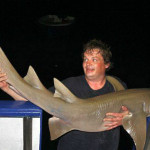In a back room of a shop on Boduthakurufaanu Magu, sea cucumbers lay drying all around and the stench of stale fish hangs thick in the air.
Ahmed Riza, 43, brings out a shark fin for inspection before opening a huge flip-top container filled with fins of varying sizes. The cartilage, once fused to the body of a ill-fated shark, was still visible, sitting like a row of teeth across each of the dull grey fins.
Riza is a middleman, who for the past 20 years, has earned a living buying and selling shark fins to foreign customers. He sells up to 400kg of shark fins a month at around Rf300 (US$23) a kilo.
But the cruel manner in which fins are sliced off sharks before their bodies are dumped in the sea, coupled with the endangered status of many species, prompted the government to make a landmark decision last year. President Mohamed Nasheed announced the Maldives would outlaw shark fishing up to 12 nautical miles (22km) off the coast of all atolls.
This March, the ban is to be extended to cover oceanic sharks – a move praised by marine biologists who have lobbied hard for the 37 species of shark that swim through the Maldives to be protected.
In preparation, the government proposed a three-point plan: find alternative livelihoods for the 200-odd shark fishermen, increase police boat patrols and educate customs officials to recognise shark products. As shark fins are largely for export, the success of the ban rests on the vigilance of Maldives Customs.
With the March deadline fast approaching, however, little appears to have been done. While Dr Hussain Rasheed, the state minister for fisheries and agriculture, maintains that “by and large people know about the shark ban”, interviews with those working in the industry reveal otherwise.
Riza was unaware that it was President Mohamed Nasheed’s administration that had made the decision.
“We first heard about it during Maumoon’s time but since this government came to power we haven’t heard anything about it. They haven’t made any official announcements,” he says.
Marie Saleem, an environment consultant who worked in the Marine Research Centre for 16 years, expresses a similar sentiment.
“I’ve also been trying to find out [what the government has done] and to my knowledge nothing has been done since then.”
Tourist attraction
Ibrahim Adam, 32, is from Alif Dhaal Dhagethi, one of main shark fishing hubs, where six boats catch around two tonnes of shark fins a month each.
A shark fisherman for the past 15 years, Adam was anxious about the impending ban, which will end his monthly income of between Rf12,000 (US$934) and Rf15,000 (US$1,167).
According to Marie, once de-finned, Maldivian fishermen do not discard the remainder of the shark.
“Although some divers have seen sharks without fins, the fishermen I’ve worked with salt and dry the shark.”
The fins are then sold to distributors such as Riza and on to foreign customers, predominantly from East Asia, where they are a delicacy. A key ingredient of shark fin soup, the fins are considered to have rejuvenating properties and sell for more than $300 a kilo.
Stable ecosystems
As predators at the top of the food chain, maintaining shark populations in balance is crucial to the preservation of ocean ecosystems. Overfishing of sharks triggers a domino effect of changes that carries down to several fish species and contributes to the overall degradation of these fragile ecosystems.
As part of their campaign, marine biologists showed that keeping sharks alive was more profitable to the Maldives: for 30 per cent of tourists who visit for the Indian Ocean archipelago for its spectacular marine life, sighting sharks is a priority.
Moreover, while the shark fishermen contribute an estimated US$100,000 a year to the economy, diving with sharks generates a hefty US$2.3 million.
In October, guests staying at Soneva Fushi resort complained after seeing shark fins drying on Baa atoll Thuladhoo, said Anke Hofmeister, a marine biologist at the resort.
“They took photos and we sent them to the ministry, but they said they were not certain these fins were from the reef so it slipped through a loophole.”
After March this loophole will be closed but both Adam and Riza say they still hope the government will amend the ban.
“We’ll be happy if they just give us an area. Maybe they can designate an area outside of the tourist zones for us,” Adam says.
In 1998, concerns about the effect of shark fishing on the tourism industry led the government to impose a 10-year moratorium on shark fishing in seven tourist atolls. However officials acknowledged there was no way of determining whether a shark fin came from a tourist atoll.
Plan of action
State Minister for Fisheries and Agriculture Dr Hussain Rasheed Hassan says the government is committed to conservation, adding his ministry is in the process of formulating a National Plan of Action using results from consultations with affected communities.
“Shark fishing is very seasonal. It’s not a livelihood as such…it’s not their whole livelihoods. Nothing drastic will happen if we have a total ban on it, and as a nation it’s our responsibility to protect sharks.”
Rasheed said the government was recruiting 30 Fisheries Enforcement Officers for all atolls to check fishing vessels for necessary paperwork as well as their catch.
But, he said, a lack of funds had thus far thwarted the government’s main objective: to buy back the equipment used for shark fishing.
“We urge those concerned and NGOs to help out by buying back the fishing gear,” he appealed.
Thereafter, the ministry plans to encourage shark fishermen to take up the more lucrative alternative of fishing for yellow-fin tuna, although Rasheed concedes, this requires larger fishing vessels.
Until then, shark fishermen such as Adam still await government assistance.
“The fisheries minister came to our island last year and told us about the ban. He said the government would find other ways for us to live before they impose the ban. We’re still waiting on that,” he said.
“I was very sad when I first heard about it. It’s my entire livelihood and what I do to support my family. It would be a great injustice to tell us not to go fishing anymore. It’s like telling someone not to go in to the office.”






The shark as a top-predator at the end of the food chain missing - that will threaten all our lives. Welcome the ban on shark fishing.
bannin shark hunting is important for tourism and evnironment. but is fisheries ministry doing anything at all to help the former fishermen? i doubt it. too much work for that lazy lot
Total ban I do not think is going to work.
If regulators would take the pros and cons before imposing a regulation and think in terms of PREVENTING rather than BANNING (which sounds more dictator like)!